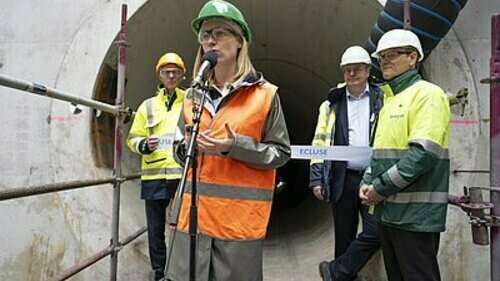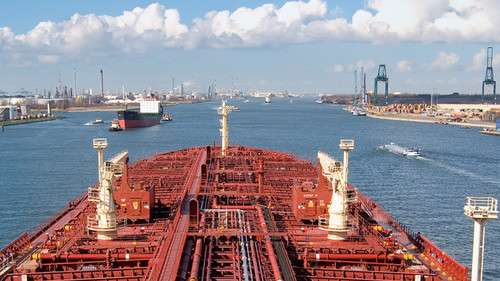ECLUSE Scheldt Tunnel Completed: Belgium’s longest microtunnel is now a reality
Work on extending the ECLUSE steam network from the left to the right bank of the Scheldt has reached a major milestone. The tunnel that will carry the pipelines beneath the river has now been completed. Flemish Minister for Energy and Climate Melissa Depraetere visited the site to inaugurate this technical achievement. In the coming months, the tunnel will be equipped to house the steam pipelines that will transport energy recovered from Indaver and SLECO’s waste-to-energy facilities on the left bank to the first customer on the right bank, Evonik. Once operational, this connection will avoid an additional 100,000 to 150,000 tons of CO₂ emissions per year – an important step towards a low-carbon energy supply for the Port of Antwerp.
A technical feat
Construction of the ECLUSE tunnel began in March 2024, following years of preparation and careful planning. Through this tunnel, ECLUSE will transport steam generated from the waste-to-energy facilities in Doel to Evonik. The tunnel marks a significant expansion of the existing ECLUSE network, which has been supplying five companies in the Waaslandhaven with process steam since 2019.
With a length of 1,288 meters, this is the longest microtunnel ever constructed in Belgium. The tunnel has an internal diameter of three meters. It accommodates the ECLUSE 2 pipelines, a central maintenance path, and additional space for future pipelines and cables. The tunnel was constructed using microtunneling, a trenchless technology suited for diverse soil types and ideal for crossings beneath roads, railways, and rivers. The boring itself lasted 14 weeks and progressed entirely according to plan. Where an average advance of 70 meters per week had been expected, the final average reached an impressive 92 meters per week.
Waste-to-energy supplies steam for chemical processes
During the incineration of waste in the waste-to-energy facilities of Indaver and SLECO in Doel, the flue gases are used to generate steam. Since 2019, this steam has been delivered directly to five neighboring companies in the Waaslandhaven, who use it according to their needs in their chemical processes.
The steam is transported at a constant pressure of around 40 bar and a temperature of approximately 400°C. With the expansion across the Scheldt and the connection of Evonik to the network, the share of steam that is directly used in industrial processes will increase significantly. Evonik has a large steam demand at its Antwerp site. Today this demand is partly met by burning natural gas. By connecting to the ECLUSE network, Evonik can substantially reduce its natural gas consumption. This reduction is equivalent to the annual use of more than 38,000 households. By using steam from ECLUSE, Evonik will also avoid annual emissions of 100,000 to 150,000 tons of CO₂. By doing so, ECLUSE actively contributes to the energy transition in the port of Antwerp and the achievement of climate targets.
Ivan Pelgrims, Managing Director, Evonik Antwerp NV:“Connecting to the ECLUSE network marks a turning point in our climate strategy. By meeting our steam demand largely with low-carbon energy from waste-to-energy, we are taking a major step towards our goal of 55% CO₂ reduction by 2030. This project shows how industrial cooperation and technological innovation go hand in hand to achieve the climate objectives of Flanders and Europe. Evonik is proud to be the first customer on the right bank to contribute to a more sustainable industrial ecosystem in the Port of Antwerp.”
“As Minister of Climate and Energy, I believe it is extremely important for companies to actively participate in the energy transition. The Ecluse tunnel under the Scheldt proves that investments in sustainable energy are good for both the climate and our industry. It makes companies less dependent on fluctuating natural gas prices in geopolitically unstable markets. And it anchors our energy-intensive industry towards a fossil-free future. That, in turn, is good for preserving our jobs. We will continue to encourage projects like this one," said Flemish Minister for Energy and Climate Melissa Depraetere.
Boudewijn Vlegels, Chairman Maatschappij Linkerscheldeoever, on behalf of ECLUSE: “Thanks to the unique mix of public legitimacy and private strength, the ECLUSE network in the Waaslandhaven is now, only a few years after the first steam deliveries, being expanded to the port on the right bank. By doing so, the Port of Antwerp, as the largest industrial cluster in the region, is actively contributing to the energy transition.”
Next steps
With the completion of the tunnel under the Scheldt, an important milestone has been reached, but the works are not yet finished. In the meantime, a second, shorter boring of 185 meters under the Scheldelaan towards Evonik on the right bank has also started. This boring, which will take about four weeks, crosses the Scheldelaan and railway tracks. In parallel, preparations are ongoing for the installation of the support structures on which the pipelines will later be mounted. Completion of the full project is scheduled for the end of 2026.
The ECLUSE tunnel is being realized through cooperation between private and public partners: Indaver, SLECO, FINEG, Maatschappij Linkerscheldeoever, and Port of Antwerp-Bruges, with the support of the Flemish government.
key points of the relationships
- Steam Source: SLECO, along with Indaver, operates waste-to-energy facilities in Doel (on the left bank of the Scheldt). The process of incinerating waste at these facilities generates large amounts of steam.
- ECLUSE Partnership: SLECO is a private partner in the ECLUSE public-private partnership. The ECLUSE network is the steam distribution system itself.
- Tunnel's Purpose: The completed ECLUSE Scheldt Tunnel, Belgium's longest microtunnel, is a critical expansion of the existing ECLUSE steam network. The pipelines within the tunnel will carry the steam generated at the Indaver and SLECO facilities from the left bank to a new customer, Evonik, on the right bank of the Scheldt.
Categories
Investments
2023-01-01
at Port Of Antwerp (BE)Chemical substances
Countries
Companies
Latest news
INEOS launches €250m investment supported by the French Government to secure the future of French industry at Lavera
The project marks the first phase of a long-term regeneration plan to reduce emissions, boost reliability, efficiency and competitiveness, with support of the French State.
Hycamite’s technology to decarbonize shipping awarded AiP by industry leader DNV
Kokkola Industrial Park →Hycamite’s proprietary Thermo-Catalytic Decomposition (TCD) technology offers a new approach to producing clean hydrogen by breaking down methane, the primary component of liquefied natural gas (LN...
Clariant catalysts will power the Ecoplanta: Europe's first waste-to-methanol plant
Chemmed Cluster Tarragona →Repsol is building Europe’s first plant to produce renewable methanol from urban waste The facility will use Enerkem gasification technology to produce 240 KTA of methanol Clariant will supply cata...
Lilly plans to build a new $3 billion facility to boost oral medicine manufacturing capacity in Europe for patients worldwide
Netherlands site will bring 500 manufacturing and 1,500 construction jobs while further strengthening Lilly's global supply chain



